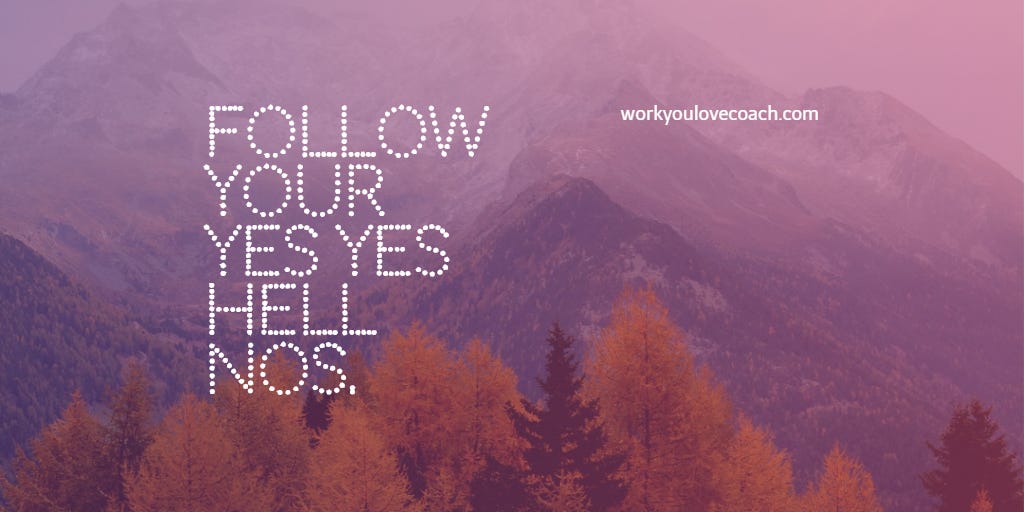How to Forge Your Own Path, When Paved Roads Are Everywhere
The key: taking grounded leaps of faith.
Hi friend,
Do you sometimes feel like you are inside the box? I sure have had that experience, and it ain’t pleasant.
Our box is created by a number of walls, including
our comfort zone,
our habitual thinking,
our perfectionistic tendencies
our conditioning, and
our routines.
Of course, not everyone likes the metaphor of a box. For instance, Robyn Jane points out that talking about boxes is actually limiting in itself:
“Just by thinking outside the box, you recognize the existence of that box. And by acknowledging that there is even a box in the first place, you posit the idea of only two positions: either inside or outside of the box. And by doing so, you’ve already locked yourself into one or the other.”
So, let’s use a different metaphor. Let’s talk about…
Roads and paths
Another way to understand this is that our box is the road that is paved, as opposed to the path we need to forge ourselves.
And, because it is a paved road, it was created for the general public.
This forest picture shows the difference between well-trodden general roads and individual paths:
The most obvious thing in this picture is the wide path in the middle. But on the right, there’s a tiny path leading off somewhere else.
That tiny path looks much less convenient and obvious than the “regular road”. However, it also promises a different scenery, and more adventure and excitement.
Paved roads
Paved roads can look like what Morgan Linton describes:
“go to a good school, check , […]. Intern at a good company, check , […]. Graduate, check , I was wearing a cap and gown and managed to finish with both University and College honors so was adorned with a tassel and a medal.”
And, there is nothing wrong with paved roads. In some ways, our civilizations are built on them. Paved roads help us built skills, gain insights, and become productive members of society.
The only challenge with them is this:
The paved road takes you to the destination our culture assumes everyone wants to get to.
Your path
Whereas your path, well, it might lead through the wilderness but it takes you where you actually want to go. (Just remember to bring bug spray.)
Of course, part of your path may actually already be paved. What you have done in the past probably got you much closer to where you actually want to go. At the same time, your path is most likely less frequented than the standard route your culture proposes.

🌟 Words of motivation 🌟
In my experience, it's definitely worth it to create your own path.
Yes, it is harder in some ways (because you are leaving the apparent safety of the paved road)… but it's also easier in others (because you aren’t going against your own desires).
The benefits of being in alignment with yourself are immense, and accumulate over time. For instance, my life is so much better now than it was a few years, let alone a decade ago.
Had I stayed on the paved road, I don't think I would have the same experience. So, let’s talk about how to follow your own path in life. If you create your own path…
How the hell do you know which way to go?
Once we stop following our culture’s “paved road” and explore what we genuinely want, lots of questions emerge.
For instance, can you relate to any of the following?
Should you go back to grad school?
Should you stay in your relationship?
Should you take that job?
Should you apply for that promotion?
Should you get married? Or divorced?
Should you have a kid? Or another kid?
The most refined concept (that’s still user-friendly) I know for finding answers to these challenging questions was developed by Dr. Brian Whetten.
It’s called….
Yes, Yes, Hell No
That may seem like a pretty strange name but it will make sense in a moment.
“Yes, Yes, Hell No” considers three perspectives when making a decision:
intuition 💡
reason 💭
fear. 😨
Often, the decisions that will most help you grow are those that receive a “Yes, Yes, Hell No” response:
Your intuition lights up (the first “yes”) ✔️
Your reason thinks it makes sense (the second “yes”) ✔️
Your fear tells you to run the other way (the “hell no”) ❌
“Yes, Yes, Hell No” goals are aligned and get you out of your comfort zone — all while making sense from a rational point of view. Pursuing these types of goals will help you forge your own life path.
When I first came to the US after leaving my legal career in Germany, I took a 1.5 year training with Dr. Brian Whetten — and learning about his framework was a lightbulb moment.
I realized that my decisions to get married, move to another continent and start my business had all been “Yes, Yes, Hell No” decision… I just didn’t know what to call them.
When I started using this framework with my coaching clients, friends, and family members many years ago, I was amazed by the clarity it can bring.
If you want to explore it on your own, you can use the following process:
Yes Yes Hell No in action
Grab a pen and paper. 📝Then, take a moment to go through the following process.
Pick a dilemma you’re currently experiencing
Write down a dilemma situation and be as specific as possible. For instance: “I don’t know whether I should take this new job or not. I will earn less money but it sounds much more exciting than my current job.”Write down the different options you have
List all the different options you are considering in this situation. For instance: “Option A: I can take that job offer. Option B: I can stay in my current job.”Consult your fear
On a scale of 1 (no fear at all) to 10 (panic attack!), how much fear does Option A bring up for you? For instance: “If I think about leaving my job, I feel really scared. Maybe that’s an 8 on that scale.”Consult your intuition
On a scale of 1 (ugh!) to 10 (best.thing.ever!!!), how much does Option A light you up? For instance: “If I imagine walking into my new office each day, I’m so excited. It really makes me happy. I think it’s a 10!”Consult your reason
Now that you have gotten feedback from your fear and your intuition, allow your reason to bridge the gap between the two. On a scale of 1 (worst.idea.ever!!!) to 10 (totally makes sense), how much does Option A make sense from a rational point? For instance: “So, I’m really scared about earning less money than before but the truth is that I can make that work if I’m being financially prudent. There’s also the possibility of getting a raise at my new job in a year or so. Also, I’ve been considering leaving my current job for a really long time and I willprobably always feel scared. Given that I have an offer right now that really appeals to me, I might just as well take the leap now. So, I think my reason is a 9.”
Consolidate all the answers you have gotten for Option A
For instance: “So, my intuition is a 10. That’s the first yes. My reason is a 9, that’s the second yes. My fear is an 8, that’s the hell no. So, I think I have my yes/yes/hell no-decision.”If you like, repeat the process for the other options
For instance, here’s an abbreviated version of what that could look like: “I feel a bit of fear about turning down the offer and staying in my job. So perhaps my fear is a 4? I don’t feel lit up by the idea, so my intuition is perhaps a 3? And my reason doesn’t think it’s a good idea either, so perhaps a 3 as well? I think that is a no/no/yes. Not very exciting and probably not the best decision I can make.”
The idea 💡
If you want to create your own path, follow your Yes, Yes, Hell Nos. By consulting your intuition, your reason, and your fear, you can take grounded “leaps of faith” that move you in the right direction.
Warmly,
Louise
P.S.: One of my favorite activities is helping people create their own paths. It’s so exciting, because everyone’s path is utterly unique! And it feels great to help people be in alignment with what they truly want.
If you want to find out more about how I’m helping people create their own paths, check out my offerings here.
P.S.: The power of baby steps
Inspired by Miriam Rachel’s comment, here’s something I recently wrote about baby steps:
We underestimate the power of small, consistent steps. 👣
But Rome wasn’t built in a day. It grew over centuries.
And sure, you can get married in a day. But it takes years to build a really solid relationship.
The only change you can make in an instant?
Burn something down. 🔥
Whether that’s Rome or your marriage. (Not that I recommend doing either.)
You certainly can destroy something in a day.
But building it?
That, my friend, takes a lot longer!
We don’t have to forge our path in one day, and the truth is, we can’t! :)





It’s so easy to stick to your comfort zone so what helps me is literally taking baby steps
Okay, so now you really have me thinking. I've thought of making changes in my life, especially around work. The intuition says yes, the reason says it could work, but I've been giving the final judgment to the fear, which of course says "Hell no!" I've assumed that should be a deal breaker, but you're saying the opposite. This suggests a lot not only about *what* to weigh in the process of choosing, but about the *meaning* of each criteria. I've spent a lot of my life believing that lots of fear means I shouldn't do it. So now, I'm going to experiment with doing some recalibrating and see where that leads me. Most of my childhood was spent responding to intense fear: emotional, social, and personal (including legitimate physical fear). My desire to feel safe runs deeply. But it also means I've spent a lot of time doing work that didn't fully express me. They've helped give me stability, but they've also left me feeling I was missing my real path. But maybe I need to quit letting my fear be a stop sign.